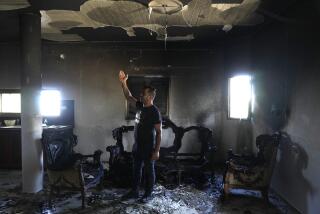Israel Presses Its Drive Against Extremists : Mideast: Leader of Hebron settlers is arraigned on old charges. But he vows to remain.
- Share via
JERUSALEM — Pressing their campaign against extremist Jewish groups in the occupied West Bank, Israeli authorities on Tuesday brought the leader of the 450 Jewish settlers in Hebron into court here on a 2-year-old charge, symbolizing the political shift now under way.
Rabbi Moshe Levinger, spiritual father of the Israeli settlers movement in the West Bank and Gaza Strip, was charged with interfering with the troops policing Hebron, where the little community of Jews living among 70,000 Palestinians has long been a flash point of tension.
The charge was relatively minor and the incident far from threatening, even at the time. But Levinger was arraigned in Jerusalem district court and will go on trial next month to make clear the government’s determination to halt settler attacks on Palestinians. The maximum sentence is six months in jail.
Levinger, however, replied at a right-wing rally in Tel Aviv on Tuesday evening that he and other settlers are equally determined to remain in Hebron and elsewhere in their communities in the West Bank and Gaza Strip.
“We will not be moved, and I believe fully that nothing bad will happen to the Jews in Hebron,” Levinger said to the cheers of an estimated 30,000 supporters at one of Tel Aviv’s largest political rallies in recent years.
Benjamin Netanyahu, chairman of the opposition Likud Party, told the rally, “If we don’t have the right to live in Hebron, we don’t have the right to live anywhere in this country.
“A government like this must be brought down. . . , “ Netanyahu said of Prime Minister Yitzhak Rabin’s center-left coalition. “We will fight for the heart of our land.”
The protesters, a few toting rifles, marched from the Square of the Kings of Israel in the center of Tel Aviv to the nearby Defense Ministry. Pushing baby carriages, carrying torches and waving Israeli flags, they chanted slogans against Rabin and his “leftist government.” Four people were reported arrested in scuffles with police.
Meanwhile, Israeli security forces were on high alert to foil suicide attacks threatened by Muslim fundamentalists on Jewish settlers in revenge for a settler’s massacre of about 30 Palestinians as they prayed in a Hebron mosque last month.
In the northern Gaza Strip, an Israeli police undercover squad opened fire on a car whose occupants had just shot at an Israeli army patrol, said a military spokesman; two Palestinians were killed.
Acting on government orders, police closed the offices of Kach and Kahane Chai, two extremist Jewish groups outlawed on Sunday. Dr. Baruch Goldstein, the U.S.-born settler who carried out the Hebron attack before being beaten to death, belonged to Kach; members of both groups are believed responsible for other attacks on Palestinians.
The Israeli human rights group B’Tselem charged in a hard-hitting report Tuesday that, over the years, the army and police have allowed settlers to attack Palestinians “with virtual impunity,” rarely intervening to halt armed assaults and even more rarely prosecuting those responsible, even when Palestinians were killed.
Eitan Fellner, a B’Tselem researcher, said Israeli military authorities have come to view settlers, “despite of or because of” the attacks on Palestinians, as “a contribution to security and the maintenance of public order” in the West Bank.
Israeli military and police spokesmen had no immediate comment on the B’Tselem report, but the army issued a statement saying Israeli troops are authorized to shoot at settlers if they endanger other lives. Police and army officers testifying before a commission investigating the Hebron massacre said last week that standing orders prohibited firing at settlers in any circumstances.
Emily L. Hauser of The Times’ Jerusalem Bureau contributed to this report from Tel Aviv.
More to Read
Sign up for Essential California
The most important California stories and recommendations in your inbox every morning.
You may occasionally receive promotional content from the Los Angeles Times.













